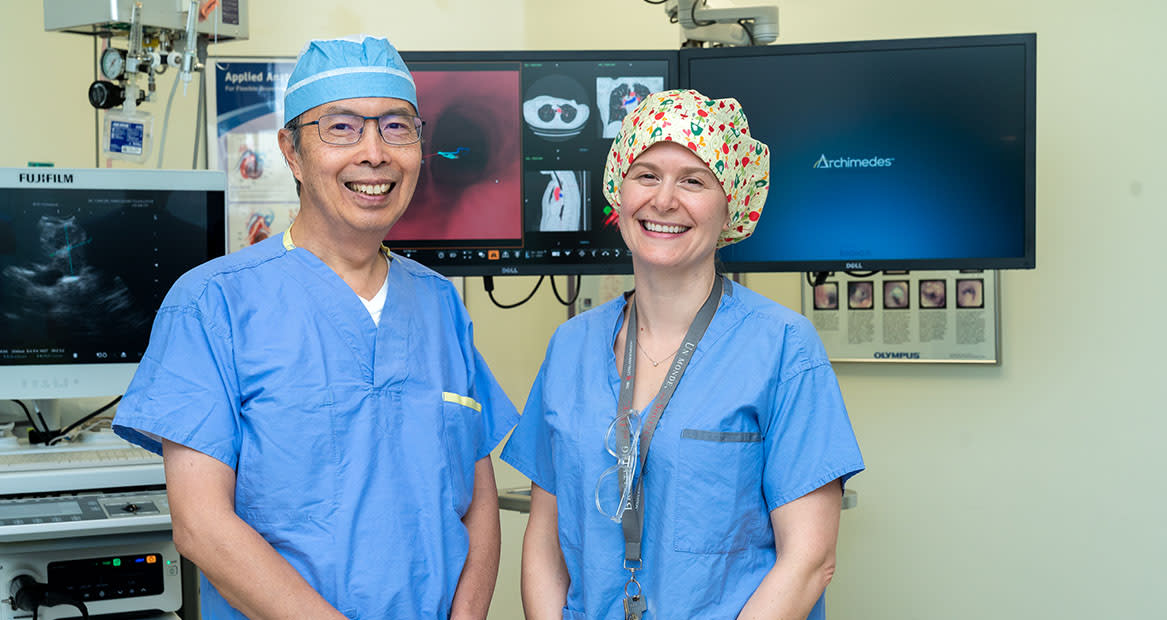
Lung Cancer
Support BC Cancer’s World-Leading Lung Cancer Research
For more information, contact Elissa Morrissette, Vice President, Development. Please consider donating today.
Lung cancer is the leading cause of cancer-related death in B.C., across Canada and worldwide. Six British Columbians die of lung cancer every day.
The main reason lung cancer tends to have a poor prognosis is that the disease is commonly diagnosed at a later stage due to few symptoms early on. In addition, the drugs currently used to treat advanced lung tumours are not effective in the long term and drug resistance is common.
Although most cases of lung cancer are associated with smoking, about 30% occur in patients who have never smoked. BC Cancer researchers have proven that lung cancer found in people who have never smoked is a completely distinct disease from that seen in smokers.
Transforming Lung Cancer Care For British Columbians
In February 2021, the BC Cancer Foundation announced a philanthropic investment of $15.3 million from the Leon Judah Blackmore Foundation to advance lung cancer research and care.
It is Canada’s largest known philanthropic investment specifically supporting lung cancer, a long stigmatized and underfunded area in cancer research.
Lung Cancer Research Progress To Date
BC Cancer Is At The Global Forefront Of Innovation
BC Cancer’s lung cancer research team is led by Distinguished Scientist and Leon Judah Blackmore Chair in Lung Cancer Research Dr. Stephen Lam and Clinical Scientist Dr. Renelle Myers. Dr. Lam has pioneered the development of population-based lung cancer technology and systems. Dr. Myers leads B.C.’s first ever Breathomics Lab, which is dedicated to studying the components of breath to detect lung cancer earlier.
Under their leadership, a multidisciplinary team is driving a number of groundbreaking research projects to advance early detection of lung cancer and improve outcomes for all British Columbians. With a track record of excellence and innovation in lung cancer research, BC Cancer is ideally positioned to achieve life-saving results.

"I am always so grateful for the generosity of people who support BC Cancer. Without it, we would not be able to provide the high-quality care to our patients or conduct innovative, world-leading research."
Dr. Stephen Lam
The majority of people are referred to BC Cancer only once they have developed symptoms — as a result, nearly 75% of lung cancer cases are detected at an advanced stage once the cancer has already spread. On the other hand, when lung cancer is detected early, it is highly treatable.
Research and Care Recent Developments
Fuelled by generous donors, BC Cancer has made significant progress in lung cancer research and care over the last few years. For example:
- In 2020, BC Cancer acquired state-of-the-art equipment to establish a first-in-B.C. Breathomics Lab. Based on their research and equipment, the Breathomics team was invited to co-lead a global consortium to create a breath atlas, which will document exhaled breath in different states of health and respiratory illnesses;
- In 2022, B.C. became the first in Canada to implement a provincial lung cancer screening program which provides screening for eligible high-risk people in hopes of detecting lung cancer at an earlier, more treatable stage. “Approximately 71% of the cancers identified are in early Stage 1 or 2. All of these cancers were found in people who do not have symptoms suspicious of lung cancer,” explains Dr. Lam.
- The lung cancer research team received two large multi-institution grants to develop and test a new breath test that will harness artificial intelligence (AI) to address gaps in early lung cancer detection to reach a more diverse population. This includes non-smokers, who account for roughly 30% of lung cancer cases. “Lung cancer used to be viewed as a tobacco user’s disease, but it’s not,” emphasizes Dr. Myers. “We have to look harder at how our environment affects our lung health.”
- The Lung Tumour Biobank, led by Medical Oncologist Dr. Barb Melosky, is helping scientists identify new biomarkers that may enable early diagnosis, predict recurrence and help match patients with the most effective therapies. The biobank recently expanded from its launch site in Vancouver to include patient samples from BC Cancer – Kelowna, with plans to expand across the province.
Support BC Cancer’s World-Leading Lung Cancer Research
For more information, contact Elissa Morrissette, Vice President, Development. Please consider donating today.